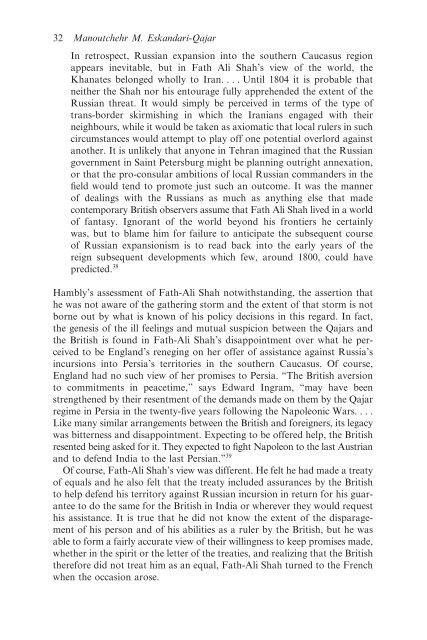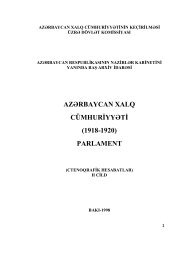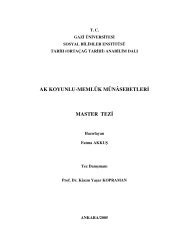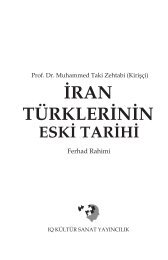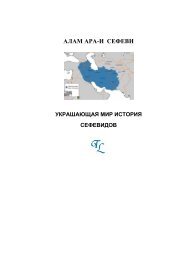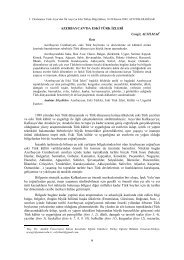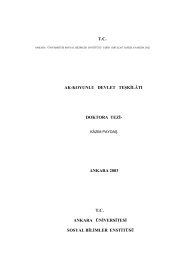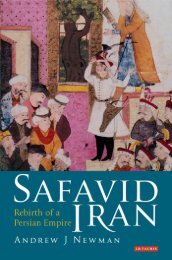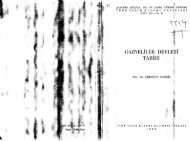War and Peace in Qajar Persia: Implications Past and ... - Oguzlar.az
War and Peace in Qajar Persia: Implications Past and ... - Oguzlar.az
War and Peace in Qajar Persia: Implications Past and ... - Oguzlar.az
- No tags were found...
Create successful ePaper yourself
Turn your PDF publications into a flip-book with our unique Google optimized e-Paper software.
32 Manoutchehr M. Esk<strong>and</strong>ari-<strong>Qajar</strong>In retrospect, Russian expansion <strong>in</strong>to the southern Caucasus regionappears <strong>in</strong>evitable, but <strong>in</strong> Fath Ali Shah’s view of the world, theKhanates belonged wholly to Iran. ...Until 1804 it is probable thatneither the Shah nor his entourage fully apprehended the extent of theRussian threat. It would simply be perceived <strong>in</strong> terms of the type oftrans-border skirmish<strong>in</strong>g <strong>in</strong> which the Iranians engaged with theirneighbours, while it would be taken as axiomatic that local rulers <strong>in</strong> suchcircumstances would attempt to play off one potential overlord aga<strong>in</strong>stanother. It is unlikely that anyone <strong>in</strong> Tehran imag<strong>in</strong>ed that the Russiangovernment <strong>in</strong> Sa<strong>in</strong>t Petersburg might be plann<strong>in</strong>g outright annexation,or that the pro-consular ambitions of local Russian comm<strong>and</strong>ers <strong>in</strong> thefield would tend to promote just such an outcome. It was the mannerof deal<strong>in</strong>gs with the Russians as much as anyth<strong>in</strong>g else that madecontemporary British observers assume that Fath Ali Shah lived <strong>in</strong> a worldof fantasy. Ignorant of the world beyond his frontiers he certa<strong>in</strong>lywas, but to blame him for failure to anticipate the subsequent courseof Russian expansionism is to read back <strong>in</strong>to the early years of thereign subsequent developments which few, around 1800, could havepredicted. 38Hambly’s assessment of Fath-Ali Shah notwithst<strong>and</strong><strong>in</strong>g, the assertion thathe was not aware of the gather<strong>in</strong>g storm <strong>and</strong> the extent of that storm is notborne out by what is known of his policy decisions <strong>in</strong> this regard. In fact,the genesis of the ill feel<strong>in</strong>gs <strong>and</strong> mutual suspicion between the <strong>Qajar</strong>s <strong>and</strong>the British is found <strong>in</strong> Fath-Ali Shah’s disappo<strong>in</strong>tment over what he perceivedto be Engl<strong>and</strong>’s reneg<strong>in</strong>g on her offer of assistance aga<strong>in</strong>st Russia’s<strong>in</strong>cursions <strong>in</strong>to <strong>Persia</strong>’s territories <strong>in</strong> the southern Caucasus. Of course,Engl<strong>and</strong> had no such view of her promises to <strong>Persia</strong>. “The British aversionto commitments <strong>in</strong> peacetime,” says Edward Ingram, “may have beenstrengthened by their resentment of the dem<strong>and</strong>s made on them by the <strong>Qajar</strong>regime <strong>in</strong> <strong>Persia</strong> <strong>in</strong> the twenty-five years follow<strong>in</strong>g the Napoleonic <strong>War</strong>s. . . .Like many similar arrangements between the British <strong>and</strong> foreigners, its legacywas bitterness <strong>and</strong> disappo<strong>in</strong>tment. Expect<strong>in</strong>g to be offered help, the Britishresented be<strong>in</strong>g asked for it. They expected to fight Napoleon to the last Austrian<strong>and</strong> to defend India to the last <strong>Persia</strong>n.” 39Of course, Fath-Ali Shah’s view was different. He felt he had made a treatyof equals <strong>and</strong> he also felt that the treaty <strong>in</strong>cluded assurances by the Britishto help defend his territory aga<strong>in</strong>st Russian <strong>in</strong>cursion <strong>in</strong> return for his guaranteeto do the same for the British <strong>in</strong> India or wherever they would requesthis assistance. It is true that he did not know the extent of the disparagementof his person <strong>and</strong> of his abilities as a ruler by the British, but he wasable to form a fairly accurate view of their will<strong>in</strong>gness to keep promises made,whether <strong>in</strong> the spirit or the letter of the treaties, <strong>and</strong> realiz<strong>in</strong>g that the Britishtherefore did not treat him as an equal, Fath-Ali Shah turned to the Frenchwhen the occasion arose.


